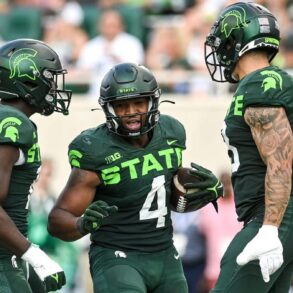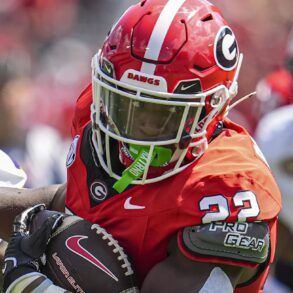
College football’s perpetual motion machine is bound to end up with the sport consolidating into one so-called “Super League” in the coming years, Clemson coach Dabo Swinney has predicted.
That league would consist of 40 to 50 teams and could kick off “probably the best era for college football,” the veteran coach said, via The Athletic.
“It’s not sustainable the way we are,” he said. “It’s just a matter of time.”
He added: “It’s one of those things even though for some of us it’s really clear to see, we’ve just got to go through it to get there.”
This isn’t the first time the idea of a super league has come up. The proposal has actually been presented to some of the sport’s better-placed decision makers before.
A group calling itself College Sports Tomorrow, composed of sports executives, university presidents, and at least one NFL official, had a plan, it was revealed last year: Take the 70 most important programs in college football, including every Power school and Notre Dame, and name them as permanent members of a national league.
The permanent members would be organized in seven 10-team divisions, joined by an eighth division of schools that are promoted from the second tier, according to that idea.
Those 50 schools that are ranked in the second division would have the chance to earn promotion into the first league in a system similar to European football leagues.
But unlike that system, first league teams would not be in danger of relegation to the second league.
The new playoff system would do away with the selection committee, instead automatically promoting the eight division champions and eight wild-card schools from the top tier to the postseason for a chance at the national championship.
Wild card spots would be determined by records and tiebreakers, similar to the NFL.
Members of the ACC’s board of directors reportedly heard a proposal for the super league last year, but no meetings with SEC, Big Ten, or Big 12 brass were held.
College football’s richest and most athletically dominant conferences, the SEC and Big Ten, are not said to be interested in the super league idea.
While one league may be college football’s future, Swinney stressed that, given how few players go into the NFL, there will still have to be a strong focus on academics.
“Football is not a game of longevity. Ninety-eight percent of these kids aren’t playing pro football… We need to equip them for life,” he said.
“If you’re playing football at 27, you’re an old man. And I just feel like and worry that the game is going to use a lot of these kids right now, because the adults have kind of left the room.
“The adults are all downstairs sipping wine, and we’ve put a bunch of kids up in the room with fireworks and gas and knives and we don’t think anything bad is going to happen.”
A super league of this kind was recently floated in Europe by some of football’s top decision makers, with a similar proposal to combine the top clubs, but the idea was met with widespread, passionate opposition and protests from fans who opposed the idea, and it was dropped.
Creating a college football super league could face obstacles of its own, but most likely not from fans taking to the streets. Instead, that opposition may come from the sport’s leadership.
In particular, the mega-deals that conferences have signed with media partners, contracts that run into the billions of dollars and last for several years. It may be unlikely anyone will be able to offer something better than what leagues already have, incentivizing leaders to maintain the status quo.
But college football’s ongoing changes won’t stop interested parties from floating whatever ideas they can to find new ways of organizing the sport.
In the end Swinney nailed what will be college football’s principal motivation, whatever happens: “Eventually, money’s going to win the day.”
—
This post was originally published on this site be sure to check out more of their content.









